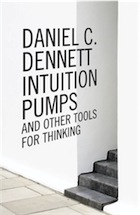Philosophy
Related: About this forumPump-primer
Tools for pondering imponderables

Intuition Pumps and Other Tools for Thinking.
By Daniel Dennett.
W.W. Norton; 496 pages; £28.95
Jun 15th 2013 | From the print edition
“THINKING is hard,” concedes Daniel Dennett. “Thinking about some problems is so hard that it can make your head ache just thinking about thinking about them.” Mr Dennett should know. A professor of philosophy at Tufts University, he has spent half a century pondering some of the knottiest problems around: the nature of meaning, the substance of minds and whether free will is possible. His latest book, “Intuition Pumps and Other Tools for Thinking”, is a précis of those 50 years, distilled into 77 readable and mostly bite-sized chapters.
“Intuition pumps” are what Mr Dennett calls thought experiments that aim to get at the nub of concepts. He has devised plenty himself over the years, and shares some of them. But the aim of this book is not merely to show how the pumps work, but to deploy them to help readers think through some of the most profound (and migraine-inducing) conundrums.
As an example, take the human mind. The time-honoured idea that the mind is essentially a little man, or homunculus, who sits in the brain doing clever things soon becomes problematic: who does all the clever things in the little man’s brain? But Mr Dennett offers a way out of this infinite regress. Instead of a little man, what if the brain was a hierarchical system?
This pump, which Mr Dennett calls a “cascade of homunculi”, was inspired by the field of artificial intelligence (AI). An AI programmer begins by taking a problem a computer is meant to solve and breaking it down into smaller tasks, to be dealt with by particular subsystems. These, in turn, are composed of sub-subsystems, and so on. Crucially, at each level down in the cascade the virtual homunculi become a bit less clever, to a point where all it needs to do is, say, pick the larger of two numbers. Such homuncular functionalism (as the approach is known in AI circles) replaces the infinite regress with a finite one that terminates at tasks so dull and simple that they can be done by machines.
http://www.economist.com/news/books-and-arts/21579427-tools-pondering-imponderables-pump-primer
Tuesday Afternoon
(56,912 posts)Such homuncular functionalism (as the approach is known in AI circles) replaces the infinite regress with a finite one that terminates at tasks so dull and simple that they can be done by machines.
Binary ... almost.
That's interesting, gives a little hope for a real AI
(That 'homunculus" reminds me of a Steampunk novel ![]()
Tuesday Afternoon
(56,912 posts)Response to rug (Original post)
Sweeney This message was self-deleted by its author.